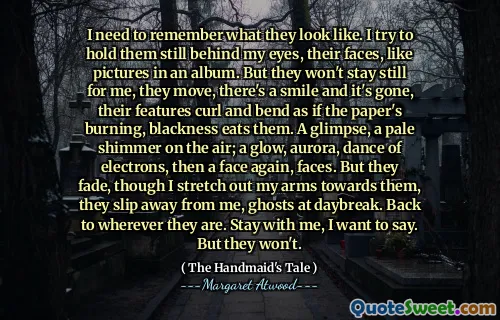What I need is perspective. The illusion of depth, created by a frame, the arrangement of shapes on a flat surface. Perspective is necessary. Otherwise there are only two dimensions. Otherwise you live with your face squashed up against a wall, everything a huge foreground, of details, close-ups, hairs, the weave of the bedsheet, the molecules of the face. Your own skin like a map, a diagram of futility, criscrossed with tiny roads that lead nowhere. Otherwise you live in the moment. Which is not where I want to be.
The quote from Margaret Atwood's "The Handmaid's Tale" emphasizes the importance of perspective in understanding life. It suggests that without perspective, one is limited to a narrow view, akin to being up against a wall where only the details of the immediate surroundings are visible. This lack of depth leads to an overwhelming focus on minutiae rather than the broader picture of existence. In this constrained view, life feels futile, as if caught in an intricate maze with no direction or purpose.
Atwood conveys a desire to see beyond the superficial and immediate experiences of life. She suggests that living solely in the moment restricts one's perception, preventing a fuller understanding of reality. By yearning for perspective, the speaker illustrates the need to break free from the confines of a two-dimensional existence, seeking depth and meaning beyond the close-ups of everyday life. This quest for a richer understanding propels the narrative forward and resonates with the themes of control and freedom in the novel.






